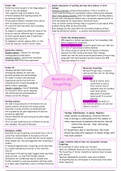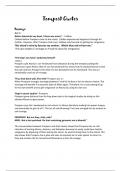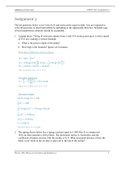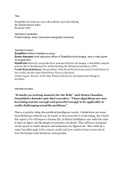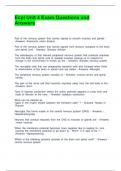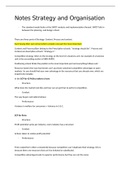M Module A: What is qualitative research?
Academic research is
● systematic: there is a process to it and we think about that process, we learn about it
● empirical: we go out in the world and gather data about it
● critical: we reflect on things, we don’t take everything at face value, we think twice
● iterative: it goes in cycles, things repeat and go backwards and forwards, you will sometimes
go back a step and revisit things
Steps in academic research:
Definitions of qualitative research
‘Qualitative research is a situated activity that locates the observer in the world’ - Denzin and
Lincoln
‘An umbrella term covering an array of interpretive techniques which seek to describe,
decode, translate, and otherwise come to terms with the meaning, not the frequency, of
certain more or less naturally occurring phenomena in the social world’ - Van Maanen
What are key elements in the above mentioned definitions?
● researcher is situated in the world, they are part of it, not detached from it
● we are interested in meaning, not in frequency
● we are looking at phenomena, things that are going on, that are more or less
naturally occuring in the social world
What is qualitative research not interested in?
- not interested in the frequency
‘Basically, qualitative researchers are interested in understanding the meaning people have
constructed, that is, how people make sense of their world and the experiences they have in
the world’ - Merriam
Interpretivism vs. positivism (philosphical orientations/ epistemological perspectives)
The interpretivist approach is associated with qualitative research
The positivism approach is associated with quantitative research
Interpretivist approach to the world Positivist approach to the world
● data is constructed with participants ● data is collected from the ‘real’ world
● data is expressed in language (you are interested in ● data is expressed in numbers
other people’s interpretations, and the way that they express those are usually in
words/images/social media)
● ‘objective’ (it should exist independently of any
researcher)
● ‘subjective’ (it comes from someone’s perspective) ● generalizable (take our findings and say
● linked to context (how people feel about one context may differ something about other groups/population)
from how they feel in another context, and this information is valuable to us, our
findings are quite tied to that particular context)
● seeking evidence of frequency
● seeking evidence of meaning
, What kind of data would we collect, how do we get knowledge?
Qualitative researchers look for ‘meaning’ Qualitative researchers look for ‘truth’
Methods for gathering interpretations .. e.g. Methods for collecting frequency e.g..
● interviews ● surveys
● ethnography ● polls
● case studies ● questionnaires
● document analysis ● content analysis
》focus is on ‘emic’ (insider) perspective 》focus is on ‘etic’ (outsider) perspective
(the perspective that comes from within the culture where the project
is situated)
》concerned with eliminating bias
》researcher’s intuition can be an asset 》researcher’s influence should be
(you have the capacity to interpret to what people are telling minimized
you, to empathize and have your own take of what is going
on)
Example: Covid-19 around the world
● what could a quantitative study investigate? → numbers of people impacted, send surveys to see a
numerical value of how people are feeling
● what could a qualitative → feelings, experiences, how social practices are changing during this time
To sum up, the qualitative research process by Patton:
Qualitative research is an effort to understand situations in their uniqueness as part of a
particular context and the interactions there
This understanding is an end in itself, so that it is not attempting to predict what may happen
in the future necessarily, but to understand the nature of that setting - what it means for
participants to be in that setting, what their lives are like, what’s going on for them, what their
meanings are, what the world looks like in that particular setting - and the analysis to be able
to communicate that faithfully to others who are interested in that setting
The analysis strives for depth of understanding
we deal with different logics: how do we arrive at new knowledge?
Deductive logic/approach (deduction) - what you have been experiencing in quantitative research
You start with theory, what is already known and from there you decide on the hypothesis
you want to test, you then collect data against which to test the hypothesis and then the
hypothesis is either confirmed or not supported and that then improves our theory
● very top down: you start with theory and then you end up down the bottom there with
your actual data
Inductive logic/approach (induction) - what you have been experiencing in qualitative research
You start with observations & data, we often say that this means that our research is grounded in
data, you might for example start observing meetings and then form there start to think about hang
on there is something that goes on here repeatedly, there is a pattern, that might lead you to a
tentative hypotheses (what you think is going on), and that leads you to start to build up theory
● bottom up: you start with your data and you build up and understanding from it
What do we do as qualitative researchers
We take an interpretivist approach: we interpret an already interpreted world. There are no simple
'facts', only interpretations of the world.
vs. an positivist approach: A scientific methodology allows us to gain objective, trustworthy and generalisable
data
Academic research is
● systematic: there is a process to it and we think about that process, we learn about it
● empirical: we go out in the world and gather data about it
● critical: we reflect on things, we don’t take everything at face value, we think twice
● iterative: it goes in cycles, things repeat and go backwards and forwards, you will sometimes
go back a step and revisit things
Steps in academic research:
Definitions of qualitative research
‘Qualitative research is a situated activity that locates the observer in the world’ - Denzin and
Lincoln
‘An umbrella term covering an array of interpretive techniques which seek to describe,
decode, translate, and otherwise come to terms with the meaning, not the frequency, of
certain more or less naturally occurring phenomena in the social world’ - Van Maanen
What are key elements in the above mentioned definitions?
● researcher is situated in the world, they are part of it, not detached from it
● we are interested in meaning, not in frequency
● we are looking at phenomena, things that are going on, that are more or less
naturally occuring in the social world
What is qualitative research not interested in?
- not interested in the frequency
‘Basically, qualitative researchers are interested in understanding the meaning people have
constructed, that is, how people make sense of their world and the experiences they have in
the world’ - Merriam
Interpretivism vs. positivism (philosphical orientations/ epistemological perspectives)
The interpretivist approach is associated with qualitative research
The positivism approach is associated with quantitative research
Interpretivist approach to the world Positivist approach to the world
● data is constructed with participants ● data is collected from the ‘real’ world
● data is expressed in language (you are interested in ● data is expressed in numbers
other people’s interpretations, and the way that they express those are usually in
words/images/social media)
● ‘objective’ (it should exist independently of any
researcher)
● ‘subjective’ (it comes from someone’s perspective) ● generalizable (take our findings and say
● linked to context (how people feel about one context may differ something about other groups/population)
from how they feel in another context, and this information is valuable to us, our
findings are quite tied to that particular context)
● seeking evidence of frequency
● seeking evidence of meaning
, What kind of data would we collect, how do we get knowledge?
Qualitative researchers look for ‘meaning’ Qualitative researchers look for ‘truth’
Methods for gathering interpretations .. e.g. Methods for collecting frequency e.g..
● interviews ● surveys
● ethnography ● polls
● case studies ● questionnaires
● document analysis ● content analysis
》focus is on ‘emic’ (insider) perspective 》focus is on ‘etic’ (outsider) perspective
(the perspective that comes from within the culture where the project
is situated)
》concerned with eliminating bias
》researcher’s intuition can be an asset 》researcher’s influence should be
(you have the capacity to interpret to what people are telling minimized
you, to empathize and have your own take of what is going
on)
Example: Covid-19 around the world
● what could a quantitative study investigate? → numbers of people impacted, send surveys to see a
numerical value of how people are feeling
● what could a qualitative → feelings, experiences, how social practices are changing during this time
To sum up, the qualitative research process by Patton:
Qualitative research is an effort to understand situations in their uniqueness as part of a
particular context and the interactions there
This understanding is an end in itself, so that it is not attempting to predict what may happen
in the future necessarily, but to understand the nature of that setting - what it means for
participants to be in that setting, what their lives are like, what’s going on for them, what their
meanings are, what the world looks like in that particular setting - and the analysis to be able
to communicate that faithfully to others who are interested in that setting
The analysis strives for depth of understanding
we deal with different logics: how do we arrive at new knowledge?
Deductive logic/approach (deduction) - what you have been experiencing in quantitative research
You start with theory, what is already known and from there you decide on the hypothesis
you want to test, you then collect data against which to test the hypothesis and then the
hypothesis is either confirmed or not supported and that then improves our theory
● very top down: you start with theory and then you end up down the bottom there with
your actual data
Inductive logic/approach (induction) - what you have been experiencing in qualitative research
You start with observations & data, we often say that this means that our research is grounded in
data, you might for example start observing meetings and then form there start to think about hang
on there is something that goes on here repeatedly, there is a pattern, that might lead you to a
tentative hypotheses (what you think is going on), and that leads you to start to build up theory
● bottom up: you start with your data and you build up and understanding from it
What do we do as qualitative researchers
We take an interpretivist approach: we interpret an already interpreted world. There are no simple
'facts', only interpretations of the world.
vs. an positivist approach: A scientific methodology allows us to gain objective, trustworthy and generalisable
data


